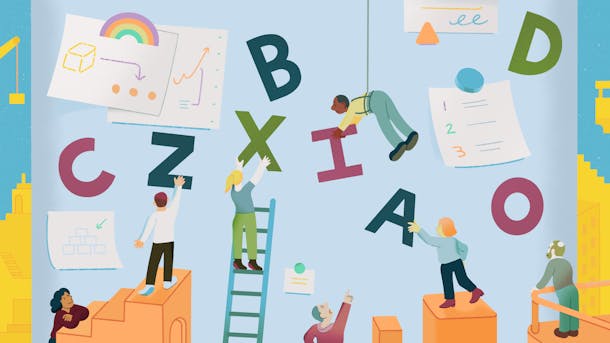Grow
In it together: How to build a healthy co-founder relationship that lasts

Key steps and strategies to help co-founders navigate the intensity and stress of building and growing a business together.
When Myra Castañeda-Selva was earning her master’s degree in marriage and family counseling at Northwestern University, her husband, Jorge, was co-founding a company with a good friend. Myra would study and counsel couples and families at the clinic during the day and then return home at night to hear Jorge describe his experiences and those of other founders in the startup community.
Early on, Myra recognized many parallels between the relational issues that co-founders were navigating and those of the folks she was working with as a therapist. Intrigued, she began meeting with co-founders in the Chicago area. “I just put myself out there, from a place of curiosity,” Myra said. “As I learned more about experiences people were having as co-founders, I became really interested in trying to bridge the gap between relational issues and the business world.”
She also saw a clear need among founders for this kind of insight and support. The high-pressure environment and the glorification of founder/CEO hustle culture make it tough for entrepreneurs to reveal any vulnerability.
“I think that there was — and still is — a lot of shame for founders around even talking through their struggles navigating co-founder relationships,” Myra said. “Especially in the tech space and startup ecosystem, you have a lot of pressure to present a really united, brave face because you're looking for investments. You need people to not only buy into your company, but buy into who you are as co-founders.”
In 2016, Myra founded Amity Chicago to offer founder and co-founder counseling. Since then, she and her team have provided coaching and workshops to individuals, companies, accelerators, and investors. Therapy and coaching services like those offered by Amity Chicago are becoming more common, as more founding teams are recognizing how their relationship can affect the health of their companies and workforces.
In fact, co-founder relationships can make or break a business right from the outset. Lean startup and entrepreneurship expert — and co-founder of four startups — Steve Blank noted in an interview with First Round Review that one third to one half of startups melt down over team dynamics before they ever get funded. And, in his research into 10,000 founders for The Founder’s Dilemma, Noam Wasserman, Dean of the Sy Syms School of Business at Yeshiva University, found that 65% of high-potential startups fail as a result of conflict among co-founders.
It might be obvious that if you don’t click with your co-founder, building a company together is a non-starter. But digging in and doing the work to maintain a healthy relationship — or even figure out if you’re paired with the right person before you launch — is a fairly new trend with a serious upside for founders who choose to do so.
With that in mind, if you’re a founder seeking a co-founder, if you and your co-founder are already in it for the long haul, or if you’re somewhere in the messy middle, read on to learn what you and your co-founder(s) can do to help create and maintain a connection that will benefit you on both a human and a business level.
Ready, Set: Foundational steps to building a better relationship
If you’re at the outset of a search for a co-founder, you’re probably already aware of all the ways this process feels like dating. You’re looking for that perfect match — the yin to your yang. But before you commit, it’s good to ground the process of finding a co-founder with a few key steps to be sure you’re entering into this important relationship with your eyes wide open and your intentions clear. And, if you’re already in a co-founder relationship, take time to consider if you’ve checked these boxes. It’s never too late to strengthen your connection.
1. Start with self awareness
Whether you’re seeking a co-founder or you’re navigating existing challenges, Myra said: “I truly believe you need to first understand yourself in order to better understand a partner — in this case your co-founder. You have to go inwards first.”
This first step is about self-exploration and developing awareness around your expectations as a co-founder in this relationship. Spend some time thinking about what makes you tick and what you need from the relationship — personally and for the business — so you can seek out a person who complements and supports your needs and expectations.
A few key questions to ask yourself:
What are your personal values and how do those convictions show up in your personal life and work?
What's your preferred work style (hours, patterns, preferred environment)?
How do you communicate and navigate conflict?
What are your personal and functional strengths?
What causes you to feel stressed, and how do you react when you experience stress?
What are your needs from a co-founder (business and personal)?
Through this self-work, Myra said, you’ll gain insight to share with your co-founder (at the start or at any point in your journey together) and create a common language of understanding and awareness that will help you do the relational work to thrive together.
2. Make time to connect in different contexts
However you’ve been introduced to a potential co-founder — through work, school, colleagues, or mutual acquaintances — it��’s important to dig beneath initial, surface-level interactions and do the work to discern skills, values, and personal characteristics.
In Esther Perel’s How to Set Up a Healthy Co-Founder Relationship, the psychotherapist, author, and host of the How’s Work? podcast urges co-founders to move beyond the coffee date and do something together that offers insight into how the other person reacts in different settings and with a variety of people. “Go to an exhibit, a lecture, a birthday party — any setting where you can put them in better context,” she said. If your potential co-founder is a colleague, partner as often as you can on work projects, but also step out of the professional setting to get a broader sense of values and communication.
Many co-founders connect in school, which provides an opportunity to collaborate and get a sense of skills and communication styles. HubSpot co-founders Darmesh Shah and Brian Halligan met in grad school at MIT Sloan, and Darmersh noted in an interview that simulating a co-founder relationship through various academic projects offered the chance to see each other’s complementary skills and values and showed them that they truly liked spending time together — something Darmesh said shouldn’t be underestimated. “Make sure you like [the person], that you have mutual admiration or respect,” he said.
3. Get it all out in the open
If you’ve connected meaningfully with a potential co-founder and are ready to commit, it’s time to pop the question — or questions. Clarifying the big ticket items — your vision for the company, your desired impact (on the industry, your team, the world), and your financial goals, for instance — is critical.
When Myra works with potential co-founders, she presents her clients with a detailed list of questions to explore together, which includes everything from defining potential roles and responsibilities to corporate structure, funding, team culture, and, of course, relationship dynamics.
Covering questions about specific roles and responsibilities upfront can be especially important, she said. “Lack of clarity around roles can breed resentment, which is always a dangerous emotion in any kind of relationship,” Myra cautioned. To avoid this scenario, talk openly about expectations and how specific roles will or won’t suit each founder’s skills, goals, and leadership style.
There are quite a few publicly available co-founder resources available for this period of exploration, including:
Go: Commit for the long term
After the initial growth and exploration stages, it’s important to remain committed to ongoing, effective communication with your co-founder(s). Here are some tips to keep in mind while working toward a long-term, productive relationship:
1. Create rituals or check-ins to keep communication (and fun) on the calendar
“Setting aside time for vulnerability and human interaction separate from the daily interactions around the business is essential,” Myra said. She recommends putting weekly co-founder meetings on the calendar and urges her clients to meet voice-to-voice or in person when possible. Regular co-founder retreats can also provide opportunities to talk about the big issues as well as a chance to kick back, have some fun, and connect around something other than work. “Try to preserve those moments where you can really come together as friends and maintain that connective tissue that brought you together initially,” Myra said.
2. Listen actively and reflectively
If you’re aiming to maintain open, effective communication with your co-founder, listening is key. And if you think this is obvious advice, you’re right. But it’s not as simple as you may think. “Many of us assume that we inherently know how to listen,” Myra said, “but in fact, many of us can hear, but we aren’t actually listening to what someone's saying.”
To hone your listening skills as co-founders, consider trying a technique called “reflective listening,” which Myra said can slow down communication and help partners discern what’s actually happening for the other person. The technique is pretty straightforward: The speaker succinctly shares the topic they’d like to discuss (“I’d like to talk about…”), and the listener absorbs the idea and repeats it back to the speaker (“What I hear you saying is…”). If there’s any misalignment, the speaker can clarify (“What I actually meant was…”). The speaking/listening sequence continues until the speaker has finished what they wanted to say and feels heard and understood, at which point partners can switch roles.
3. When disagreements arise, look back to shared values — and documented agreements
Talking through conflict isn’t easy, but avoiding difficult conversations can create a toxic co-founder relationship pretty quickly. The key for resolution among many long-term co-founders is consistently grounding discussions in the values and vision that brought them together in the first place.
In a recent article describing keys to the success of her co-founder relationship over the years, Stacey Abrams — voting-rights advocate and Georgia gubernatorial candidate — who has launched three businesses with co-founder Lara Hodgson, said: "When we had to discuss hard things, when we had tough conversations, we were always grounded in a shared value system."
The co-founders’ intentional documentation of those values from the outset, as well as documentation of milestone decisions along the way, has also helped them avoid conflict. "We had evidence of our intentions, and that gave us the ability to really focus on what was driving the conversation."
4. Consider regular meetings with an objective coach or therapist
While some co-founders seek out therapy or coaching to help work through a specific challenge or to navigate a crisis, it’s becoming more common for folks to sign on for regular, ongoing coaching.
“Therapy can be a way to hold space and listen to one another,” Myra said. “Committing to regular time in a safe space where they can check in and say, ‘Hey, I'm feeling like this today’ or ‘I'm burned out’ or ‘I had a rough call with this investor’ can be really helpful.” These guided sessions facilitate conversations, pull you out of normal dynamics, and push you to talk about things that maybe don't always feel comfortable but can really move you forward.
It’s OK to reframe the relationship: When moving forward means taking different paths
Ideally, if you’ve done the work to connect with a co-founder who shares your values and goals and you’re implementing some of these key strategies, yours will be a co-founder relationship that stands the test of time — and funding rounds.
But sometimes that doesn’t happen. Co-founders aren’t always a good fit, despite their best efforts. When issues arise that begin to make that clear, Myra works with co-founders to be able to step back and ask, “Is this working? Are we a good team? Are there changes we can make?”
If the answers to those questions lead co-founders to realize they can’t move forward together, that decision is clearly difficult — but necessary. Working with a counselor or coach, individually or as a pair, can be helpful in moving through this transition.
“When a co-founder relationship falls apart, it’s not unlike divorce,” Myra said. “Partners don’t expect they will need to separate and have tried hard to make it work, but sometimes it needs to happen to serve the people and the business.”
While a co-founder separation can be wrought with emotion, there can also be relief at the end for founders who know they need to step out of a relationship that doesn’t serve them as individuals or the company they are trying to build. Myra wants to normalize that scenario. “It's hard for many people to think about, but having gone through it with many teams, it's really impactful for founders to be able to disengage to move forward — to not feel stuck.”
Counseling can help founders work through the aftermath of a co-founder separation, Myra added. “They’ve been through a breakup, and they are often grieving — the company, the relationship, their past identity,” she said. When these feelings surface, it’s helpful to reframe the experience as a shifting of gears — a transition, not a failure.
Ultimately, co-founder relationships are similar to other relationships in life: They require ongoing, shared effort, they’re enhanced by a healthy dose of vulnerability, and they can be incredibly fulfilling — with the potential to be difficult and painful at times. Co-founders will be at an advantage when they enter into their relationship with both self-awareness and a commitment to the work required along the way.
Help desk software for customer-centric founders
Help Scout’s platform is easy to start and built to scale as your business grows.
Free 15-day Trial



